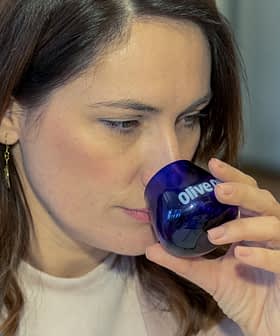
Fernando Burgaz (photo: Spanish Ministry of Agriculture, Food and the Environment)
As debate deepens in Spain and wider Europe over reform to the troubled olive oil sector, the Spanish central government and a local government group have both made quality the keystone of their calls for change.
Fernando Burgaz, managing director of the food industry unit of the Spanish Ministry of Agriculture, Food and the Environment (MAGRAMA), said the challenge was to “preserve olive oil’s image by offering consumers a guarantee of the quality of the product they buy.”
His comments were in a statement published after his April 26 meeting with various agri-food cooperatives.
“Perfecting” the Panel Test
Organoleptic analysis was “indispensable” for the classification and rating of virgin and extra virgin olive oils and it helped uphold quality and consumer confidence, but some perfection of the system was needed, Burgaz said. “We are working on improvements to the methodology of the panel test and exploring possible physico-chemical means to complement it.”
He did not say what type of tests but relevant physical and chemical characteristics of olive oil could include the level of acidity, peroxides, colour, humidity, and impurities.
Burgaz said MAGRAMA was also “considering various ways it could help improve the operation of private test panels and optimize their service to the sector.”
Labeling
At the level of the European Union and the International Olive Council (IOC), Spain is pushing for olive oil labels to include details such as a best-before date and preservation advice, Burgaz said. “To help guarantee quality for the end consumer.”
New vegetable oil quality standard
Nationally, MAGRAMA is developing a new quality standard on vegetable oils with some provisions specific to olive oil. Burgaz said the ministry was resuming consultation with the sector so that the standard, to be enforced by Royal Decree, could be put in place soon.
He gave no details but media reports last year said a feature of the draft version — introduced before the change of government in Spain — was the requirement of more stringent self-monitoring, quality control and traceability at olive oil mills, refineries, bottlers, and so on.
Olive Tree Municipalities’ Manifesto
In a declaration approved unanimously at its national assembly on April 27, the Spanish Association of Municipalities of the Olive Tree (AEMO for its initials in Spanish) said that Spain’s olive oil sector was enduring a fourth year of crisis with record production but below-cost farm gate prices.
Stopping the “banalization” of olive oil and achieving fair prices would be achieved by increasing consumption and raising the prestige of the flagship product — extra virgin olive oil, it said.
To increase the awareness and appreciation of virgin and extra virgin olive oils’ intrinsic benefits — including for health and gastronomy — AEMO called for a series of measures, the first of which related to panel tests
“Sensorial evaluation is absolutely essential for the quality control of virgin and extra virgin olive oils and increasing appreciation of the differentiating characteristics of the juice of the olive fruit compared to other vegetable oils. It is therefore necessary to work on the coordination of existing test panels while also promoting the creation of new panels to serve the needs of industry and government,” it said.
Quality Control
“We also think it’s essential to strengthen the enforcement of olive oil marketing standards, paying particular attention to the virgin and extra virgin categories. The lack of quality control in the different categories is undermining the the brand image of Spanish virgin olive oils, which is unacceptable in the country that is the world’s biggest producer.”
Among other measures sought by AEMO:
- require olive oil bottles used in the hospitality sector to be non-refillable,
- promote fair trade in olive oil with consumer education about producers operating at a loss, and setting a minimum price that assures their future viability,
- stop the “excessive” use of olive oil as a supermarket loss leader.
“We also propose that the Ministry anaylze, along with the sector and expert groups, a change to the current product grade definitions (extra virgin olive oil, virgin olive oil, and lampante virgin olive oil in the virgin oil category, and olive oil and olive pomace oil in the refined oil category), “because we believe consumers confuse the general with the refined category. Agreed changes should later be proposed to the IOC for international application,” AEMO said.
Apart from the coming changes discussed by Burgaz, sector reforms have also been promised by European Commissioner for Agriculture Dacian Cioloş and the regional government of Andalusia. The IOC is separately reviewing testing methods.



